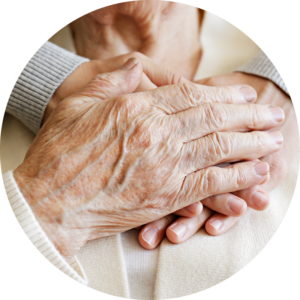Advanced Parkinson's
While many people in our community wish there were distinct stages of Parkinson’s that everyone goes through so they can anticipate what’s next, Parkinson’s doesn’t necessarily work that way. Everyone’s experience with Parkinson’s is unique, and so is everyone’s experience with its progression. However, because we know there are many questions about the progression of Parkinson’s and because there are common challenges and complications that can arise when a person has been living with Parkinson’s for many years, we’ve compiled a collection of resources to address these topics. Here, you can learn more about changing and/or increasing symptoms, cognitive decline, hallucinations, end-of-life planning, and more.

Psychiatric and Cognitive Complications in Parkinson’s
Depression, anxiety, cognitive decline, psychosis, and impulse control disorders can be common in people with Parkinson’s and have a profound effect on quality of life. It’s important as a person living with Parkinson’s or as a care partner to become more educated about these conditions, how they may affect the goal of living well, and ways to manage and mitigate them. In this webinar, Dr. Daniel Weintraub discusses Parkinson’s progression and signs to look out for; the correlation between mood, motor function, and levodopa levels; Parkinson’s disease psychosis; cognitive impairment and dementia; impulse control disorders; and how to manage these and other Parkinson’s complications.
Is It Time for Parkinson’s Home Healthcare?
At some point, your Parkinson’s may progress to the point that you need additional help at home. The timing and type of help depend on your medical condition, family situation, and financial resources. Still, it’s worth understanding the types of assistance that are available in advance, especially since the need for outside support can arise with little notice. In this post, you’ll learn about the types of home healthcare, how to choose the best option for you, and much more.
Parkinson’s Pete Embraces the Lessons of Parkinson’s
“Remember to be the kind of person YOU like to be around: cheerful not morose, self-reliant not demanding, singing not whining, laughing not complaining. Be grateful that Parkinson’s gives you a good long time to get your affairs and your thinking in order, to prepare yourself and your family for what lies ahead. You will discover that you have more choices than you probably think you have.” Read more of Parkinson’s Pete’s wisdom and advice for living well with Parkinson’s, no matter the stage, in this Moments of Victory® story.
Advanced Directives
None of us is excited about preparing for the day when we can’t make decisions or are facing the end of our lives. However, planning for the future is important for everyone, not just people living with Parkinson’s and their loved ones. And, when you make these kinds of plans early, you won’t feel extra stress or worry about preparing at the last minute. In this article, we’ll look at some of the paperwork you will want to complete now to be prepared for whatever lies ahead.
Parkinson’s Disease Psychosis with Dr. Christopher Goetz
Parkinson’s disease psychosis is a non-motor symptom that causes people to experience hallucinations and/or delusions. Approximately 50% of all people living with Parkinson’s will experience some form of hallucinations or delusions, and the longer someone lives with Parkinson’s, the greater the likelihood they’ll experience them. In this webinar, Dr. Christopher Goetz explains the causes of Parkinson’s disease psychosis, the differences between hallucinations and delusions, how to treat these symptoms, and much more.
Explore More Advanced Parkinson's Resources
Additional Videos
- Cognition and How It Interacts with Other Non-Motor Symptoms
- YOPD Council: Dementia and Young Onset Parkinson’s
- What Is Aspiration?
- How Do You Prevent Aspiration Pneumonia?
- Living Well with Parkinson's: A Conversation with Brian Grant and Davis Phinney
- Hindsight Is 20/20: Thoughts from an Old Young Onset
- The Difference Between Lewy Body Dementia, Parkinson’s, and Alzheimer’s
- Parkinson’s Homecare: What You Need to Know
- How to Bring Light to the Darker Side of Parkinson’s: A Primer on Hallucinations and Delusions and How to Manage Them
- What Is Freezing of Gait (FOG) in Parkinson’s?
- How Long Can I Keep Driving if I Have Parkinson’s?
- How to Understand and Manage OFF Times as a Parkinson’s Care Partner
- A 12-Year Population-Based Study of Psychosis in Parkinson Disease
- Understanding Parkinson’s-Related Hallucinations
- What to Know about Hospital Stays and Parkinson’s
- What You Need to Know about Osteoporosis and Parkinson’s
- Maximize Your Mobility with Fall Prevention
- The Pathophysiology of Parkinson’s
- Impulse Control Disorders and Parkinson’s: What They Are and How to Manage Them
- Should I Donate my Parkinson’s Brain to Science?
- 6 Ways to Reduce Parkinson’s Freezing of Gait
- The Benefits of Visual and Auditory Cuing for Overcoming Freezing of Gait
- How Sarcopenia Affects Quality of Life with Parkinson’s
- Rhythmic Auditory Stimulation for Prevention of Falls in Parkinson’s
- Tips for Alleviating Bowel and Urinary Dysfunction in Parkinson’s







